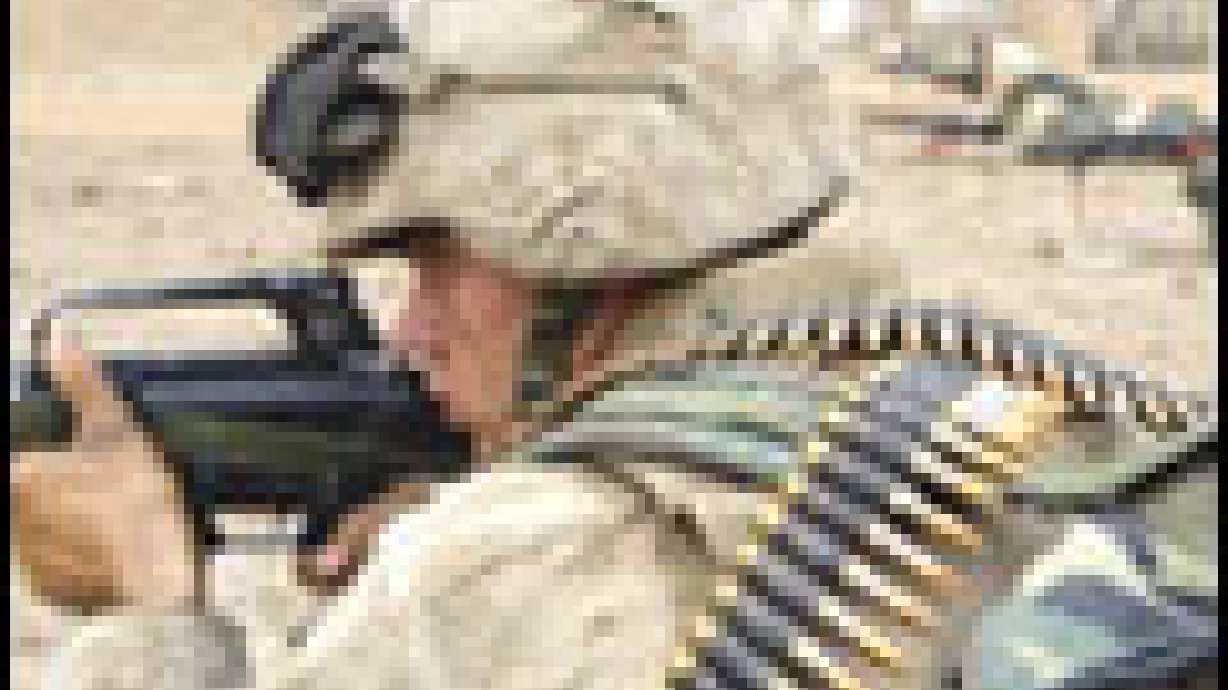Estimated read time: 4-5 minutes
This archived news story is available only for your personal, non-commercial use. Information in the story may be outdated or superseded by additional information. Reading or replaying the story in its archived form does not constitute a republication of the story.
TIKRIT, Iraq (AP) -- A top secret military team and other American forces have conducted a series of raids in the hunt for Saddam Hussein, keeping the ousted leader on the move since his sons Odai and Qusai were killed two weeks ago, the military said Monday.
Special Operations Task Force 20 -- which is roaming Iraq on the hunt for Saddam and other high-profile targets -- captured four key figures last week, 4th Infantry Division spokeswoman Maj. Josslyn Aberle said at a news briefing.
"It's just a matter of time. He can't stay in one place very long," Aberle said. Military officials had not previously acknowledged Task Force 20's involvement in the raids.
The army would not release the four men's names or their connection to Saddam. Two of Saddam's "very close associates" were captured Friday in Tikrit, Saddam's hometown, Aberle said.
Two others, described only as high-profile targets, were caught Saturday during a raid in Baiji, just north of Tikrit, she said, adding that the military is not ready to release their names. Tikrit is 120 miles north of Baghdad.
Soldiers believe they came within 24 hours of capturing Saddam's new personal security chief -- and possibly the former Iraqi leader himself -- during a July 27 raid in Tikrit, which is 120 miles north of Baghdad.
Intelligence on Saddam's whereabouts is constantly evolving and the army is poised to strike, she said.
"It was the same with Odai and Qusai, they had not been up in Mosul -- or in that house where they were captured -- very long before the intelligence came in and we got them," she said. The two were killed in a prolonged gunbattle in Mosul, a city in northern Iraq.
Military officials estimate that Saddam moves every four hours. The army has distributed composite photos of how he may have changed his appearance, hoping that they may catch him on the move.
During the night, 300 soldiers backed by Bradley fighting vehicles and Apache attack helicopters raided four sites on the outskirts of Tikrit in an operation witnessed by The Associated Press.
The operation was launched after the army got word that former regime members were gathering at one of the sites, said Lt. Col. Steve Russell, commander of the 22nd Infantry Regiment's 1st battalion.
Soldier did not find the meeting they were looking for and instead hunted for two guerrilla organizers believed to be in the area, he said. Soldiers detained an associate of one of the organizers, Russell said.
"It's like you're drilling for oil, and you're upset because you don't hit a gusher every time. The reality is we've been able to hurt the regime and he (Saddam) is a desperate and losing foe," Russell said.
Despite coming up empty handed during the raids, soldiers caught one of the suspected guerilla organizers Monday when the man came to an Army civil affairs office protesting about soldiers trampling over his land, Russell said.
"He came complaining about the raid so we brought him to the complaints department," Russell said. "He is now in our custody and we have a lot of eager individuals with pens and paper ready to listen to his complaints."
At midday Monday, the U.S. military said there had been no fatal attacks on American soldiers in Iraq since late Friday -- a respite from the increased violence against Americans in Iraq since Udai and Qusai were gunned down July 22.
Since President Bush declared an end to major combat in Iraq on May 1, 52 U.S. soldiers have been killed in guerrilla attacks.
U.S. Central Command said Sunday that raids by the 3rd Armored Cavalry in the so-called "Sunni Triangle" west and north of the capital netted "24 regime loyalists, including a targeted leader." It did not name the captives.
The U.S. civilian administrator for Iraq, L. Paul Bremer, has blamed attacks against Americans on four groups -- loyalists of Saddam's Baath Party, the Fedayeen Saddam militia, members of the ousted and once-feared security forces and foreign terrorists.
U.S. officials have increasingly blamed the violence on foreign fighters, suggesting guerrilla tactics now being used are similar to those of Osama bin Laden's al-Qaida organization and its Taliban allies in Afghanistan.
(Copyright 2003 by The Associated Press. All Rights Reserved.)








